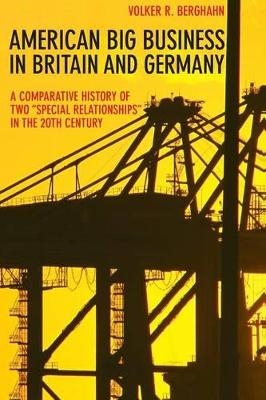
American Big Business in Britain and Germany
Princeton University Press (Verlag)
978-0-691-17144-9 (ISBN)
- Lieferbar (Termin unbekannt)
- Versandkostenfrei innerhalb Deutschlands
- Auch auf Rechnung
- Verfügbarkeit in der Filiale vor Ort prüfen
- Artikel merken
And while Britain thought they had established their special relationship with America once again in the 1980s and 90s, in actuality it was the Germans who, with American help, had acquired an informal economic empire on the European continent. American Big Business in Britain and Germany uncovers the surprising and differing relationships of the American business community with two major European trading partners from 1900 through the twentieth century.
Volker R. Berghahn is the Seth Low Emeritus Professor of History at Columbia University. His books include America and the Intellectual Cold Wars in Europe and Europe in the Era of Two World Wars (both Princeton).
Introduction 1. A Long Book in a Nutshell 1 2. Conceptualizing "Americanization" and the "American Century" 2 3. The Anglo-American "Special Relationship" 5 4. The German-American "Special Relationship" 8 5. Sources 11 6. Transatlantic History and Its Global Dimensions 12 7. The Trials and Tribulations of Venturing into a Foreign Economy 14 I The North Atlantic Business Triangle and the Constellation of 1900-1901 1. International Relations Around 1900 22 2. Assessing the Old and the New Century 23 3. Political and Economic Relations in the Age of Late-Nineteenth-Century Imperialism 27 4. Frank Vanderlip's and William Stead's Views of Anglo-American Relations 30 5. American Perceptions of the Wilhelmine Industrial System 37 6. Trying to Understand the Peculiarities of the German Political System 45 7. The Cultural Difficulties of Operating in Foreign Markets 49 II Cooperation, Peaceful Competition, and the Specter of War, 1902-1914 1. Introduction 57 2. American Foreign Direct Investments in Britain and Germany 58 3. Facing British and German Competition and Cooperation 63 4. Prince Heinrich's Mission and German-American Relations in the New Century 70 5. American Big Business in Britain and Germany at Mid-Decade 73 6. The Threat of Deteriorating Political Relations 75 7. Comparing the Peculiarities of the American and German Industrial Systems 79 8. American Big Business and the Question of Political Participation 84 9. American and European Businessmen and the Specter of a Major War 88 III From the Outbreak of War in July 1914 to the Genoa Conference, 1922 1. The Military-Political Origins of World War I 105 2. The International Business Community and the Outbreak of War in 1914 108 3. The Ambiguities of American Neutrality 113 4. The American Economy and the Moves to Enter the War 116 5. The American Entry into the War and the Dilemmas of Peacemaking 123 6. American Big Business and European Reconstruction 126 7. The Idea of an International Loan for European Reconstruction and Its Failure 131 8. The State of the American, British, and French Economies in the Early 1920s 134 9. American Big Business and the Postwar Crisis in Germany 137 10. American Big Business, Washington, and the Question of European Loans 139 11. The Origins of the Washington System in the Far East 142 12. Britain's Rival Attempt to Spearhead a European Recovery Plan 144 IV The North Atlantic Triangle: Economic Reconstruction and Collapse, 1923-1933 1. Introduction 160 2. German Reparations and the Harding Administration 161 3. American Big Business and the Crisis of 1923 165 4. Political Stabilization through the Locarno Pact 168 5. The American Business Community and the Dawes Plan 170 6. American Big Business and the British Economy 179 7. American Investments in Weimar Germany and Their Risks 187 8. The Problem of International Cartels, Trusts, and Cooperations 195 9. The Instabilities of Weimar Politics and American Business Optimism 201 10. Parker Gilbert's Pessimism and American Business Gullibility 206 11. America's Domestic Boom and the "Wild" Years of 1925-1929 211 12. The Great Slump and Its Consequences in International Politics 214 V Nazi Germany, Appeasement, and Anglo-American Big Business, 1933-1941 1. Introduction 227 2. Hitler's Ideology of Conquest and Ultimate War Aims 229 3. Hitler's Foreign Policy in the 1930s 232 4. The Underestimation of Hitler and British Appeasement 236 5. American Foreign Policy in the 1930s 239 6. American Big Business and the Roosevelt Administration 243 7. Stimulating American Industrial Production 245 8. American Views of the Hitler Dictatorship 250 9. Hitler and German Industry 255 10. Doing Business in Nazi Germany 257 11. The U.S. Auto Industry and Mass Motorization 260 12. British and American Business and the Preservation of Peace 266 13. IBM in Germany 272 VI British and German Business and Politics under the Pax Americana, 1941-1957 1. Hitler's Quest for Victory in the East 286 2. Planning for Victory and Henry Luce's "American Century" 288 3. Cartels and the "German Question" 293 4. The Role of American Big Business in Postwar Planning 299 5. The Start of the Cold War and Anglo-American Relations in Occupied Germany 301 6. The Politics of Decartelization 307 7. The Response of West German Industry to America's Recasting Efforts 313 8. Britain and the Difficulties of Economic Reconstruction 317 9. The Origins of the European Coal and Steel Community 323 10. American Big Business and Otto A. Friedrich 326 11. Modernizing Phoenix A.G. and Erhard's Anti-Cartel Bill 329 12. The Reluctant Modernization of British Industry 332 13. America and the Suez Crisis 339 Conclusions 355 Acknowledgments 365 Index 367
| Erscheinungsdatum | 03.06.2016 |
|---|---|
| Verlagsort | New Jersey |
| Sprache | englisch |
| Maße | 152 x 235 mm |
| Gewicht | 539 g |
| Themenwelt | Geschichte ► Allgemeine Geschichte ► Neuzeit (bis 1918) |
| Geisteswissenschaften ► Geschichte ► Regional- / Ländergeschichte | |
| Wirtschaft ► Betriebswirtschaft / Management | |
| Wirtschaft ► Volkswirtschaftslehre ► Makroökonomie | |
| ISBN-10 | 0-691-17144-0 / 0691171440 |
| ISBN-13 | 978-0-691-17144-9 / 9780691171449 |
| Zustand | Neuware |
| Haben Sie eine Frage zum Produkt? |
aus dem Bereich


